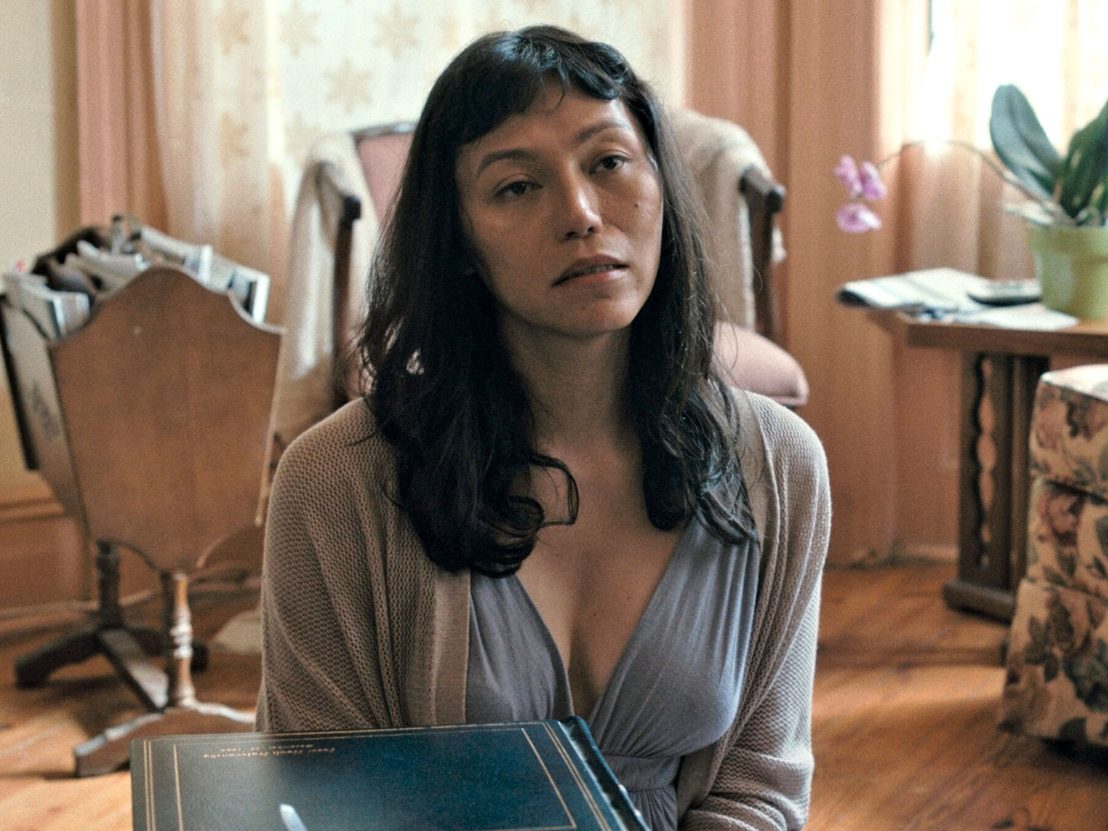
Isabel Sandoval is not only one of the greatest filmmakers working today, but one of the most formidable human beings. She is extremely versatile, empathetic, and capable of navigating any genre she turns her hand to.
Her most recent acting turn is Andrew Ondrejcak’s The Actress, released on MUBI, in which she deftly moves between pastiches of Douglas Sirk, Josef von Sternberg, David Lynch, Stanley Kubrick, Roger Vadim, and Terence Malick, all without scarcely batting her dazzling eyelashes. Capable of channelling Marlene Dietrich as easily as Jane Fonda, Sandoval isn’t bound by time and space.
The Actress feels like a film version of the new book by LWLies editor David Jenkins, ‘Filmmakers on Film’. At the heart of its pages on 50 of the greatest directors of all time is an interview with Sandoval, in which David asks her about “sensual cinema” – a filmic style she has become known for celebrating.
She describes it as a feeling you get when watching a film like Wong Kar-wai’s In the Mood for Love or Douglas Sirk’s All That Heaven Allows, where the director has managed to “project or translate the desire that they feel into something visible that can be experienced by spectators.” That form of subjectivity is an intimate sensation, and one that will be different for everyone.
Sandoval’s first feature, Señorita, is styled as an invitation for her audience to desire with her and the characters she creates, both in this film and her subsequent works. Jenkins is hosting a screening of the film to celebrate the launch of his book at the Prince Charles Cinema in London on Wednesday 13 July, with Sandoval attending in person for a conversation afterwards. It’s a rare opportunity to experience this film in the UK, and to hear from an extraordinarily empathetic and articulate artist.
I was fortunate enough to see Lingua Franca following its exhibition at the BFI London Film Festival, and felt compelled to reach out to Sandoval to discuss the impact the film had had on me. She was incredibly gracious in her response, and from our conversations it has become clear to me what makes her work so unique – her cineliteracy, and her experience as a woman who underwent a process of transition.
The former is writ large in everything she makes. The seedy neon-soaked streets and bars of Señorita are taken straight from the reels of a Kar-wai picture, while the repressed emotions and sexualities of the nuns at the convent in her second feature, Apparition, echo the overwhelming inner conflicts of the women in Powell and Pressburger’s Black Narcissus.
Her latest film, the exquisite Lingua Franca which is still yet to receive a full UK release, makes elegant use of New York ‘pillow shots’ à la Chantal Akerman via Yasujirō Ozu, while also calling upon the rich cinematic history of ‘Smoke Gets in Your Eyes’ by The Platters, which has featured in films by directors including Andrew Haigh, Rainer Werner Fassbinder, and Hou Hsiao-hsien.

Listening to Sandoval talking about these influences is entrancing. She is fascinated by representations of repressed desire and longing, something she is working into plans for a film about lesbian vampires which we discussed on my podcast last year in relation to Tony Scott’s The Hunger.
During our conversation, she revealed her potential to be inspired by anything; to find sensuality and the impetus for desire everywhere. We should all take note and learn from her mode of creation, something which I have been keen to champion in the UK, including through an upcoming screening of Lingua Franca.
What has also been incredibly powerful for me is being able to talk to Sandoval about our shared experience of transition. Feeling compelled to celebrate the change she is inspiring in representations of trans* narratives, we collaborated on a feature for Massive about sex for women who have had Gender Confirmation Surgery.
What comes through so refreshingly from the two features in which she has acted – Señorita and Lingua Franca – is that she doesn’t feel she owes anyone an explanation of her transition. She expects the same level of empathy, of understanding from her audience as she extends to them.
It’s incredibly moving watching Sandoval grow as a director and as a woman between these two films. It’s upsetting to see her deadname onscreen for her first two features, but Sandoval has talked of them as being a part of her personal transition. While Lingua Franca was, professionally speaking, her “transitional film”, it marks not the end but the very beginning of what is bound to be a long and prolific career in filmmaking. These are films which Sandoval made while her transition was very prescient for her, whereas now, as she works on her upcoming feature Tropical Gothic, it is in her past.
It seems strange to return to Señorita when so much has changed since Sandoval made the film. But it is a remarkable seminal work, one which documents an incredibly volatile moment in her personal life and career, and thereby of the beginnings of an individual’s transition.
Unlike most depictions of that process in cinema, the fact that Sandoval and her characters in Señorita and Lingua Franca are transitioning or have transitioned is merely a component of their characterisation, rather than its entirety. It’s good to reflect as Sandoval so often does, but it is more exciting to see her moving on.
Señorita receives its UK premiere at the Prince Charles Cinema on Wednesday 13 July. For tickets head to the princecharlescinema.com
Little White Lies is committed to championing great movies and the talented people who make them.
Published 9 Jul 2022

Findings from a rare public screening of John Dexter’s I Want What I Want.

The director’s work has long echoed the underlying anxiety felt in his homeland.

By Ryan Coleman
Isabel Sandoval’s third feature, Lingua Franca, gives a voice to some of the world’s most vilified and vulnerable people.